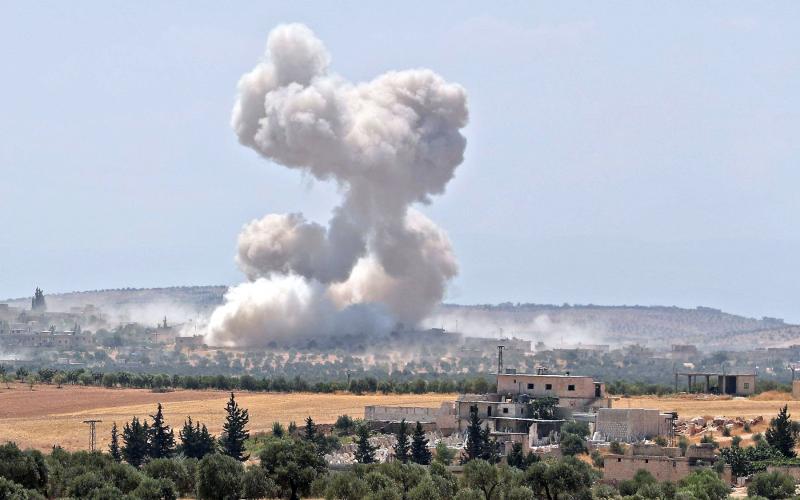Attack on Turkish convoy in Syria strains Ankara’s alliance with Moscow
Turkey and Russia have cooperated for years in Syria despite conflicting interests in the war but attacks on a Turkish military convoy and a Turkish observation post in Idlib province put unprecedented pressure on the alliance between the two powers.
Syrian government air strikes hit near the Turkish convoy August 19 as it approached front lines in Idlib. Ankara said the convoy was on its way to one of 12 Turkish observation posts in the province when the vehicles, which numbered about 40 and included tanks, Agence France-Presse reported, came under attack.
Three days later, Turkey’s state-run news agency said a Turkish observation post in Idlib came under “harassing fire” by Syrian government jets. The Anadolu Agency reported no damage or injuries in the incident.
The escalation could have consequences for Turkey’s overall policies in Syria, which rely heavily on consent by Russia, the main foreign player in the conflict. Observers said Turkey might lack necessary leverage to change Russia’s approach in Idlib, the last rebel stronghold in Syria after more than eight years of war and an area crammed with 3 million people.
Reports said tens of thousands of civilians in Idlib started to move towards the Turkish border as fighting drew closer.
A Russian-backed Syrian government advance in Idlib is squeezing Turkey’s position in the region. Concerns by Ankara about a new influx of refugees led to a Turkish-Russian agreement last year that was supposed to stabilise the situation in Idlib but the attack on the convoy raises doubts about the viability of that deal.
The Turkish Defence Ministry said the attack on the convoy violated Ankara’s agreements with Moscow, which had been informed in advance about the convoy. Three civilians were killed and 12 wounded, Ankara said.
Syrian state media said the dispatch of the convoy into Syria was an act of aggression to help insurgents fighting a Syrian Army advance in Khan Sheikhoun, a town in rebel hands since 2014 and which was bombed with sarin gas in 2017.
Syrian government forces captured the town from rebels and began encircling enemy positions south of it, the Syrian Observatory for Human Rights said.
Damascus said authorities opened a “humanitarian corridor” so civilians from the besieged rebel-held area in northern Hama province can move to parts of the country controlled by the government.
The recovery of those areas would mark an important gain for Syrian President Bashar Assad in the north-western region. A series of truces brokered via Russian-Turkish talks has failed to end the fighting.
Kerim Has, a Moscow-based expert on Russian-Turkish relations, said Ankara might be forced to give up at least one of its positions in Idlib, despite Ankara’s insistence that it will not do so. Has pointed to Turkey’s growing dependence on Russia following the recent purchase of the Russian S-400 missile defence system by Ankara.
“The delivery of the Russian-made S-400 missile systems to Turkey ties the hands of Ankara to resist [the Idlib] regime offensive in a tough way and react harshly against Moscow’s turning a blind eye to the developments on the ground,” Has wrote in response to questions. “Ankara might have to leave the ninth military point in Idlib,” he added in reference to the observation post in Morek.
The escalation in Idlib came amid speculation about an impending Turkish military incursion into north-eastern Syria. Ankara said it is determined to push Syrian Kurdish fighters from the border there. Talks between Turkey and the United States, which backs the Kurdish People’s Protection Units militia, about the establishment of a “security zone” appear to have irked the Kremlin, Has said.
“From Moscow’s perspective, the bilateral Turkey-US negotiations might have a risk of paving the way to a far-reaching Washington-designed and -mediated and an Ankara-approved Kurdish autonomy in Syria” in the long run, Has wrote.
While Russia is Assad’s main backer, Turkey has been supporting rebel groups fighting Syrian government forces. In recent years, Russia and Turkey had pushed their differences to the side as they teamed with Iran in the so-called Astana process to end the Syrian war. The Astana trio hopes that a constitutional committee for Syria can start work next month.
However, the attack on the convoy exposed deep differences between Ankara and Moscow. As Turkey protested the attack on the convoy, Russian President Vladimir Putin reaffirmed his support for Assad.
“We support the efforts of the Syrian Army… to end these terrorist threats,” Putin told French President Emmanuel Macron during a meeting August 19 in France, adding: “We never said that in Idlib terrorists would feel comfortable.”
Under the agreement with Russia last September, Turkey was to rein in Islamist fighters in Idlib, a region dominated by the Hayat Tahrir al-Sham militia. Russia and Syria say Turkey has not lived up to its commitments under the deal.
Source: Attack on Turkish convoy in Syria strains Ankara’s alliance with Moscow | | AW

